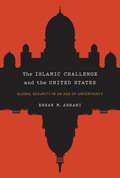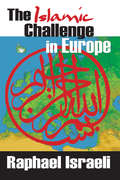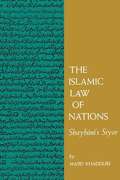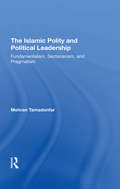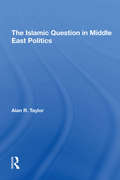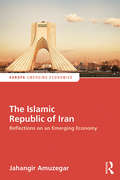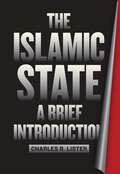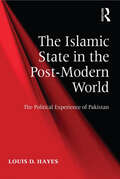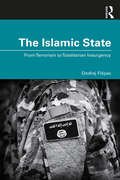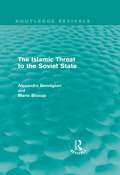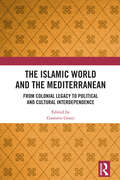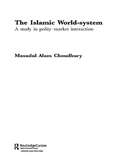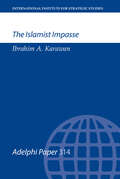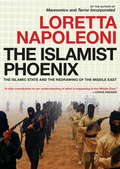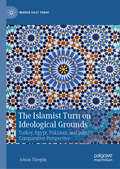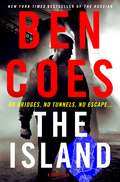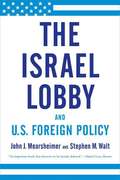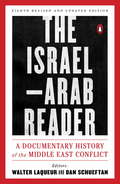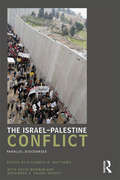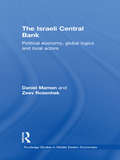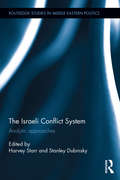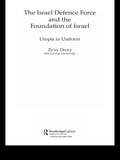- Table View
- List View
The Islamic Challenge and the United States: Global Security in an Age of Uncertainty
by Ehsan M. AhrariOn September 11, 2001, Osama bin Laden declared "global jihad" on the West. In response to the day's attacks, the United States has waged its own global war on terrorism, which the Pentagon has described as a generational conflict similar to the Cold War. In The Islamic Challenge and the United States, Ehsan Ahrari takes a close look at this ideological conflict, focusing on the Middle East, Africa, and South and Central Asia. Arguing that the war on terrorism is founded on secular fundamentalism (an ideology that envisions Islam as dangerous and volatile because it mixes religion and politics) and the Enlightenment narrative, Ahrari suggests that the United States sees global jihadists as absolutist, irrational, obscurantist, and anti-modern. While violence on behalf of the Muslim community – ummah – is thus framed as reprehensible, violence on behalf of the Western nation-state is seen as sometimes necessary and often praiseworthy. Unsettlingly, this framework does not encourage careful scrutiny of America's historical dealings with the Muslim world. The belief that religion causes violence, Ahrari argues, may blind the West to its own forms of fanaticism. A timely analysis of one of the most contested issues of our times, The Islamic Challenge and the United States is a must-read for global security practitioners, policymakers, and general readers.
The Islamic Challenge in Europe
by Raphael IsraeliSince the World Trade Center attacks in New York on September 11, 2001, Europe has been plagued by Islamist attacks that have taken many lives and disrupted many services. Considerable attention has been paid to radical Islamist attacks on the United Kingdom, France, and Germany, but far less focus has been on the Islamist extremist impact on the rest of Europe. This book warns all Europeans, but Middle Easterners as well, that they are not immune to terror. That terror is confined to Jews and Israel is a myth. Muslim extremist attacks have taken place against other Muslim nations--as well as European nations in which Jewish influence or Israeli support is negligible. The waves of Muslim recrimination against the West have given rise to internal struggles within the Arab world played out in terrorist acts. Muslim brotherhoods have defined a global war against other religions, nations, and cultures that stray from the principles of fundamentalism--a cultural and military jihad. Just where religious identity supervenes national identity has become a critical turning point. Israeli's book shows that the line between moderates and extremists within the Islamic fold is vague, ambiguous, and in certain situations non-existent. It draws attention to polls and public sentiments of the Islamic faithful, and emphasizes the Islamic attack on modernization and its cultural sources. This timely volume is addressed to those in the West who are not accustomed to thinking in apocalyptic terms. Israeli provides painstaking details of European responses to Islamist challenges, particularly those who prefer pragmatic compliance rather than response. He demonstrates that Islamic extremism continues to grow in the heartland of the European world. This is neither an optimistic nor pessimistic book; its disturbing message may be a wake-up call to some. It is a necessary read for those who want to go beyond news, opting for a more intellectual and comprehensive diet.
The Islamic Law of Nations: Shaybani's Siyar
by Majid Khadduri Muhammad ibn al-Hasan al-ShaybaniTranslated with an extensive commentary by Majid Khadduri, Shaybani's Siyar describes in detail conditions for war (jihad) and for peace, principles for the conduct of military action and of diplomacy, and rules for the treatment of non-Muslims in Muslim lands. A foundational text of the leading school of law in Sunni Islam, it provides essential insights into relations between Islamic nations and the larger world from their earliest days up to the present.
The Islamic Polity And Political Leadership: Fundamentalism, Sectarianism, And Pragmatism
by Mehran TamadonfarThis book is employed for the study of the Islamic polity and political leadership and examines the basic features of the Islamic polity. It provides a theoretical framework for the study of political authority in the Islamic world signifying individual leaders' characteristics.
The Islamic Question In Middle East Politics
by Alan R TaylorThis book provides an overview of the origins, development, and eventual encounters of secular nationalism and the various manifestations of the Islamic reform movement. The scope of the book is restricted to the Middle East (Turkey, Iran, and the Arab states).
The Islamic Republic of Iran: Reflections on an Emerging Economy (Europa Perspectives: Emerging Economies Ser.)
by Jahangir AmuzegarThis title provides an in depth study of Iran’s post 1979 Revolution economy under the Islamic Republic, with new material and related journal articles combined under one roof in a novel and reader friendly style. The volume starts with an original text, summarizing the development of the Iranian economy under five successive administrations, in five distinct phases. Following this are fifteen accompanying articles providing detailed information that expands on, and compliments, the discussion in the original material. Appropriate references on specific topics are made to each relevant article, ensuring the material is easily accessible to the reader. Topics discussed include public finance, employment, banking, petroleum, privatization, and the exchange rate. Full references are also made to US and universal economic sanctions and their effects, with the legacies of the Khatami and Ahmadinejad administrations also covered. This versatile title is designed to appeal to a vast readership. The hurried business executive or high government official, interested in a quick review of the subject matter may simply read the original text while think tank researchers, research fellows and students can take the time to read the supplementary articles and review what is related to the topic of their choosing.
The Islamic State
by Ahmed Rashid Charles R. ListerAn authoritative guide to the rise of the Islamic State and its senior leadership How did the Islamic State grow from regional terrorist group to a brutal multinational bureaucratic machine? What are its goals? How can it be stopped? In 2014, the Islamic State seemingly appeared out of nowhere, routing Iraqi forces, conquering Iraq's second-largest city, boldly announcing the establishment of a caliphate, and declaring itself the Islamic State (IS). Today, IS controls thousands of square miles and is attempting to govern millions of people.In this definitive guide to the Islamic State and its senior leadership, Charles R. Lister traces its roots from the release of its notorious father figure, Abu Musab al-Zarqawi, from a Jordanian prison and the group's formation in Afghanistan in the late-1990s, and finally to its stunning maturation in Iraq and Syria.The West knows IS through its unrelenting propaganda war. Behind the deft use of social media and the slick videos of despicable acts is what amounts to a proto-state. Lister shares details of IS's sophisticated revenue machine, attempts at governing, and its formidable military. With IS knocking on the doors of Lebanon, Jordan, and Saudi Arabia, Lister's portrait helps us understand what to expect next and recommends a course of action to defeat IS, extinguish extremism, and encourage a tolerant Islam across the Middle East. Foreword by Ahmed Rashid
The Islamic State
by Ahmed Rashid Charles R. ListerAn authoritative guide to the rise of the Islamic State and its senior leadership.How did the Islamic State grow from regional terrorist group to a brutal multinational bureaucratic machine? What are its goals? How can it be stopped?In 2014 the Islamic State seemingly appeared out of nowhere, routing Iraqi forces, conquering Iraq's second-largest city, boldly announcing the establishment of a caliphate, and declaring itself the Islamic State (IS). Today, IS controls thousands of square miles and is attempting to govern millions of people.In this definitive guide to the Islamic State and its senior leadership, Charles R. Lister traces its roots from the release of its notorious father figure, Abu Musab al-Zarqawi, from a Jordanian prison and the group's formation in Afghanistan in the late-1990s, and finally to its stunning maturation in Iraq and Syria.The West knows IS through its unrelenting propaganda war, with its deft use of social media and videos of horrific acts. Lister shares details of IS's sophisticated revenue machine, attempts at governing, and its formidable military.With IS knocking on the doors of Lebanon, Jordan, and Saudi Arabia, Lister's portrait helps us understand what to expect next and recommends a course of action to defeat IS, extinguish extremism, and encourage a tolerant Islam across the Middle East.This book includes a Who's Who in the Islamic State's senior leadership.From the foreword by Ahmed Rashid"The Islamic State is the best basic understanding available of the ISIS phenomena and how to deal with it."
The Islamic State We Knew
by Howard J. Shatz Erin-Elizabeth JohnsonThis report provides information known by the end of 2011 about the Islamic State's origins, finances, organization, methods of establishing territorial control, and response to airpower. Countering the Islamic State can rely, in part, on the great deal of accumulated knowledge available. Iraqis and coalition forces routed the group once, and this history can inform the components of another successful strategy to defeat the Islamic State.
The Islamic State in the Post-Modern World: The Political Experience of Pakistan
by Louis D. HayesThe Islamic State in the Post-Modern World is a study of the political development of Pakistan. This study consists of three parts. The first addresses the concept of the 'state' as it has evolved historically. The approach is comparative and involves a brief review of Islamic political theory. The second part of this section is the modern state, i.e., the Westphalian model. The territorial state is still the standard although it has been evolving in new directions for some time. The second section focuses on the creation of Pakistan as an experiment in bridging the gulf between the demands of the modern state and the philosophical-spiritual attraction of the Islamic model. In addition to constitutional issues, the discussion also includes political forms, i.e., the machinery of daily government and the appropriateness of democratic methods, elections, legislative process, and political parties, to achieve Islamic ends. The third part considers international issues from the beginning of the twenty-first century especially the conflicts in Iraq and Afghanistan. Despite its 'partnership' role with the US in the war on terror, Pakistan has been consistently marginalized. Pakistan’s problems are exacerbated by the conflict over Kashmir, a vestigial remnant of Pakistan’s continuous, and largely unsuccessful, efforts at self-identification.
The Islamic State: From Terrorism to Totalitarian Insurgency
by Ondrej FilipecThe Islamic State analyzes the transformation of ISIS (Daesh) from an underground insurgent organization to a quasi-state entity. It traces the genesis and evolution of what may be interpreted as a revolutionary war aimed at the creation and expansion of a new society and world order in the ruins of Syria and Iraq. This book: Analyzes the regime’s totalitarian features including structure, ideology, propaganda, and violence; Examines its ideology with a focus on radical Islamism and Salafi-jihadism; Studies the economics behind its continued existence; and Explores the attitude of key state and non-state actors, especially Russia, USA, and the Global Coalition, towards Daesh. An indispensable guide to the study of modern terrorism, this book will be of great interest to students and researchers of Middle East studies, terrorism, with a focus on ISIS, military and strategic studies, politics and international relations, as well as general readers.
The Islamic Threat to the Soviet State (Routledge Revivals)
by Alexandre Bennigsen Marie BroxupFirst published in 1983, this book traces the historical and cultural development of the Soviet Muslim population. Going back to the Mongol Empire and the Russian conquest of Muslim lands under the Tsars, it demonstrates how the present Soviet Islamic culture has emerged. It also examines how Soviet Muslims interact with the Muslim world abroad and how Soviet Muftis have been used as ambassadors of the USSR in Muslim countries.
The Islamic World and the Mediterranean: From Colonial Legacy to Political and Cultural Interdependence
by Gustavo GozziThis collection investigates the conflictual relationship between the Islamic world and Western civilization, looking at its history as key to understanding its present. The historical narrative starts from the controversial encounter that took place at the close of the 18th century, the effort being to improve our understanding of that engagement and its current implications, focusing in particular on how it has affected law, philosophy, and religion. The subsequent age of 19th-century colonialism is analysed with a view to understanding the currents of mutual influence that throughout that era ran between Islam and the Western world, looking at the law and the institutions, as well as at different strains in the culture. This discussion provides the backdrop against which the book turns a critical eye on current Euro-Mediterranean relations, highlighting the need to move beyond the conditionality principle that has traditionally been a cornerstone of European policy toward Arab Muslim peoples and to set this relationship on a new foundation, one that recognizes the interdependency between these two areas, making it possible to open up a Mediterranean space of mutual recognition among all its peoples. The book will be of interest to researchers and academics working in the areas of legal and political history, comparative law, legal philosophy, law and religion, and Islamic studies.
The Islamic World-System: A Study in Polity-Market Interaction (Routledgecurzon Advances In Middle East And Islamic Studies)
by Masudul Alam ChoudhuryThis highly original book presents an alternative vision of globalization and explores the epistemology, derived from the Qur'an and the Prophetic guidance Sunnah, that underpins the systemic unity at the heart of the Islamic concept of world-system. Choudhury's investigation reveals the ethical foundations that influence the development of law, markets and social contract in Islamic societies. He then applies his methodology to issues and problems such as property rights, money, political economy, technology diffusion, microenterprise development and asset evaluation.
The Islamist Impasse (Adelphi series)
by Ibrahim KarawanSince the mid-1970s, Islamist groups have been important opposition forces in the Arab world and have posed a considerable challenge to regimes. However, their increased influence has not led to political power. Ibrahim A. Karawan argues that Islamist movements have been unable to form an effective and united opposition, and have therefore reached an impasse. Although regimes cannot afford to ignore their Islamist challengers, the Arab world is unlikely to witness a wave of Islamist take-overs. More than 17 years after the fall of the Shah, the Iranian revolution remains an isolated case in the Middle East. The growth of Islamism is fuelled by social, economic and political discontent. Islamist movements are not passing phenomena, but the actual political threat they pose will depend mainly on their ability to form broad coalitions, and on the willingness of regimes to introduce badly needed reforms. However, Islamist movements are divided over key issues of strategy and tactics. Regimes have exploited these divisions to contain their Islamist opponents, and have blended oppression and limited political accommodation to perpetuate their rule. Despite Islamist groups’ transnational language and ideology, national and sub-national issues drive their actions. Region-wide developments – notably the ‘oil revolution’ of the 1970s and Arab military defeats by Israel – are important in understanding the overall political climate, but they will not be crucial in deciding the outcome of the Islamist–regime confrontation. The influence of the West on Arab Islamism is also unlikely to be decisive. Islamist activism is stronger in areas with greater exposure to Western influences. States are therefore keen not to be seen as being too close to Western powers. In addition, there is no one Western stance towards Islamist movements, nor is there a unified assessment of the causes and policy implications of their resurgence. Contentious political issues confront Western powers, such as linking economic aid to human rights. Political and militant movements operating under the banner of Islamism are diverse. Their deep differences over the best means to achieve their objectives fragment their ranks and undermine their effectiveness. Although Arab regimes face many challenges, they have shown greater political resilience than analysts have expected.
The Islamist Phoenix
by Loretta NapoleoniFrom its birth in the late 1990s as the jihadist dream of terrorist leader Abu Musab al Zarqawi, the Islamic State (known by a variety of names, including ISIS, ISIL, and al Qaeda in Iraq) has grown into a massive enterprise, redrawing national borders across the Middle East and subjecting an area larger than the United Kingdom to its own vicious brand of Sharia law. In The Islamist Phoenix, world-renowned terrorism expert Loretta Napoleoni takes us beyond the headlines, demonstrating that while Western media portrays the Islamic State as little more than a gang of thugs on a winning streak, the organization is proposing a new model for nation building. Waging a traditional war of conquest to carve out the 21st-century version of the original Caliphate, IS uses modern technology to recruit and fundraise while engaging the local population in the day-to-day running of the new state. Rising from the ashes of failing jihadist enterprises, the Islamic State has shown a deep understanding of Middle Eastern politics, fully exploiting proxy war and shell-state tactics. This is not another terrorist network but a formidable enemy in tune with the new modernity of the current world disorder. As Napoleoni writes, "Ignoring these facts is more than misleading and superficial, it is dangerous. 'Know your enemy' remains the most important adage in the fight against terrorism."
The Islamist Turn on Ideological Grounds: Turkey, Egypt, Pakistan, and Iran in Comparative Perspective (Middle East Today)
by Adnan TüregünMany states in the Islamic Middle East, North Africa, and South Asia that had previously experienced some measure of secularism turned to Islam in the late 20th and early 21st centuries. In so doing, they have changed the political landscape of their nations and the entire region, also significantly influencing international politics. The Islamist Turn outlines, explains, and demonstrates this change. And, on all three counts, the book fills an important gap in our collective knowledge by developing a typology of Islamist turns based on the institutional aspect of the change; offering an ideational explanation of the turns with an emphasis on the political ideologies and strategies of rulers; and studying the cases of Turkey, Egypt, Pakistan, and Iran as exemplary of the Islamist turns in the region.
The Island: A Thriller (A Dewey Andreas Novel #9)
by Ben CoesCIA operative Dewey Andreas is America's last line of defense when terrorists take over Manhattan, targeting the U.N. and the President himself in The Island, the latest in this New York Times bestselling series by Ben Coes.America is about to face the deadliest terrorist attack on it's soil since 9/11. Iran has been planning a revenge attack for years, with three goals in mind. Bring America to its knees. Assassinate the popular U.S. President J. P. Dellenbaugh. And neutralize their most successful agent, Dewey Andreas.The first pre-emptive attack against Dewey Andreas fails but it worries the head of the CIA enough that he sends Dewey out of town and off the grid. But as intelligence analysts work as fast as they can to unravel the chatter on terrorist networks, Muhammed el-Shakib, head of Iran's military and intelligence agency, launches a bold strike. When the President arrives in New York to address the U.N., embedded terrorist assets blow up the bridges and tunnels that connect Manhattan to the mainland. Taking control of the island with it's hidden forces, they race to the U.N. in search of Dellenbaugh and to launch an even deadlier attack that will wreak unimaginable destruction on the country itself.While a shocked country struggles to mount a counter-attack, a hopeless, outmanned and outgunned Dewey Andreas sneaks onto the island of Manhattan to fight a seemingly impossible battle.
The Israel Lobby and U. S. Foreign Policy
by John J. Mearsheimer Stephen M. Walt"The Israel Lobby" by John J. Mearsheimer of the University of Chicago and Stephen M. Walt of Harvard's John F. Kennedy School of Government was one of the most controversial articles in recent memory. Originally published in the London Review of Books in March 2006, it provoked both howls of outrage and cheers of gratitude for challenging what had been a taboo issue in America: the impact of the Israel lobby on U.S. foreign policy. Now in a work of major importance, Mearsheimer and Walt deepen and expand their argument and confront recent developments in Lebanon and Iran. They describe the remarkable level of material and diplomatic support that the United States provides to Israel and argues that this support cannot be fully explained on either strategic or moral grounds. This exceptional relationship is due largely to the political influence of a loose coalition of individuals and organizations that actively work to shape U.S. foreign policy in a pro-Israel direction. Mearsheimer and Walt provocatively contend that the lobby has a far-reaching impact on America's posture throughout the Middle East--in Iraq, Iran, Lebanon, and toward the Israeli-Palestinian conflict--and the policies it has encouraged are in neither America's national interest nor Israel's long-term interest. The lobby's influence also affects America's relationship with important allies and increases dangers that all states face from global jihadist terror.Writing in The New York Review of Books, Michael Massing declared, "Not since Foreign Affairs magazine published Samuel Huntington's 'The Clash of Civilizations?' in 1993 has an academic essay detonated with such force." The publication of The Israel Lobby and U.S. Foreign Policy is certain to widen the debate and to be one of the most talked-about books of the year.
The Israel-Arab Reader: Eighth Revised and Updated Edition
by Walter Laqueur Dan SchueftanAn essential resource, completely revised and updated for the sixtieth anniversary of the founding of IsraelIn print for forty years, The Israel-Arab Reader is a thorough and up-to-date guide to the continuing crisis in the Middle East. It covers the full spectrum of the Israel-Arab conflict, including a new chapter recounting the Gaza withdrawal, the Hamas election victory, and the Lebanon-Israel War. Featuring a new introduction that provides an overview of the past 115 years of conflict, and arranged chronologically and without bias, this comprehensive reference includes speeches, letters, articles, timelines, and reports dealing with all the major interests in the area.
The Israel-Palestine Conflict
by James L. GelvinThe conflict between Israelis and their forebears, on the one hand, and Palestinians and theirs, on the other, has lasted more than a century and generated more than its share of commentaries and histories. James L. Gelvin's account of that conflict offers a compelling, clear-cut, and up to date introduction for students and general readers. Beginning in the mid-nineteenth century, when the inhabitants of Ottoman Palestine and the Jews of eastern Europe began to conceive of themselves as members of national communities, the book traces the evolution and interaction of these communities from their first encounters in Palestine through to the present, exploring the external pressures and internal logic that has propelled their conflict. The book, which places events in Palestine within the framework of global history, skillfully interweaves biographical sketches, eyewitness accounts, poetry, fiction and official documentation into its narrative, and includes photographs, maps and an abundance of supplementary material. Now in a revised edition, Gelvin's award-winning book takes the reader through the 2006 Summer War and its aftermath.
The Israel-Palestine Conflict: Parallel Discourses (UCLA Center for Middle East Development (CMED) series)
by Elizabeth G. MatthewsThe conflict between the Israelis and the Palestinians is considered intractable by many, and is frequently characterised by the violence between the two sides. In attempts at peace, the starting point for negotiations is a cessation of violence; beneath this, however, lies a plethora of other issues to be addressed. This unique text brings together Israeli and Palestinian viewpoints on a number of key issues and topics, making clear the points of agreement as well as the views that divide. The chapters deal first with three issues that require compromise and resolution for a peace treaty to be realized - water, refugees, and borders, territory and settlements – and then with three important concepts that can either impede or promote peace: democracy, human rights, and peace culture and education. Thus, the book provides an invaluable opportunity to understand, at least in part, the divergent and even convergent interests and understandings of Israelis and Palestinians on issues and concepts important to the peace process. As such, it will be a valuable resource for courses on conflict resolution, the Middle East peace process, and political science.
The Israeli Central Bank: Political Economy, Global Logics and Local Actors (Routledge Studies in Middle Eastern Economies)
by Daniel Maman Zeev RosenhekThis book examines the local and global political and institutional processes that have led to the strengthening of the Israeli central bank within the context of the now predominant neoliberal regime. Using Israel as a case study to identify broader patterns around the world, the authors examine the strengthening of central banks as a key dimension of the institutionalisation of the global regime. Drawing on an in-depth analysis of the political economy of the Israeli central bank since the mid-1980s, the authors show how the Bank of Israel mobilized global logics in order to strengthen its position vis-à-vis competing actors, especially the Ministry of Finance, and to promote the institutionalisation of the neoliberal regime. Employing a conflict-centered theoretical perspective, the authors elucidate the character of this institutional transformation and the mechanisms that were involved. Chapters examine the different phases of the process of central bank strengthening, focusing on the actors involved, the interactions between them, and the political strategies they employed, and analyse the consequences of the process for the shift in macro-economic management and in the mode of state involvement in the economy. Addressing the political and institutional processes that have led to the fundamental transformation of Israeli political economy, this book is a valuable addition to the existing literature on the Israeli banking system, political economy and globalisation.
The Israeli Conflict System: Analytic Approaches (Routledge Studies in Middle Eastern Politics)
by Stanley Dubinsky Harvey StarrThe Middle East conflict system is perhaps the world’s most important and intractable problem area, whose developments carry global consequences. An effective investigation of the context and change in the region calls for a melding of academic approaches, methods and findings with policy oriented needs. The Israeli Conflict System brings together leading conflict scholars primarily from political science, applying a range of advanced, rigorous analytic and data-gathering techniques to address this single empirical domain—the contemporary Israeli Conflict System. Recognising the causal complexity of this conflict system, the volume’s central theme is that the system’s current conditions are best understood in their broader temporal/historic, cultural/linguistic, and spatial/geographic contexts. Through the lens of economic, geographic, historical, linguistic, and political analyses, and the application of data analysis, experiments, simulations, and models of rational choice, this volume shows how diverse disciplinary perspectives and methodologies can complement each other effectively. In this way, its chapters provide a model for the integration of factors and contexts necessary for understanding contemporary world politics, and a sampling of theories, approaches, and methods that are applicable, useful, or valid under different conditions. This book offers a cutting-edge resource for scholars and students of Political Science, International Relations, Conflict Studies and Middle East Studies.
The Israeli Defence Forces and the Foundation of Israel: Utopia in Uniform
by Ze'ev DroryThis book discusses the contribution of the Israel Defence Forces (IDF) to the building of the social and educational foundations of the country, and its role in the area of immigrant absorption and settlement during the first years of the Israeli State. The author examines how under the guidance of David Ben-Gurion Israel was able to utilize the values of military organization to combat severe, economic, and social difficulties, and build a civil society to underpin the new state.
